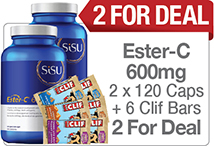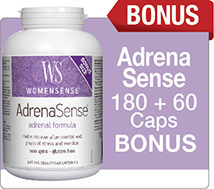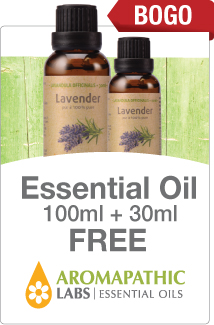Sterols
How Do Plant Sterols Help Heart Health?
What are plant sterols? The discovery of plant sterols, a group of naturally occurring compounds found in plants, has been a fascinating journey that has significantly contributed to our understanding of nutrition and its impact on human health. Also known as phytosterols, they were first identified in the early 20th century as cholesterol-like molecules present in plants. Read more >-
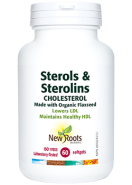 STEROLS & STEROLINS CHOLESTEROL FORMULA FROM NEW ROOTS HERBAL. Sterols are plant fats and alcohols that have gained in popularity and recognition in recent years. They have a positive effect on negative cholesterol levels and HDL/LDL ratios. Many trust them for immune boosting and modulation. Phytosterols and sterolins are plant fat...STEROLS & STEROLINS CHOLESTEROL FORMULA FROM NEW ROOTS HERBAL. Sterols are plant fats and alcohols that have gained in popularity and recognition in recent years. They have a positive effect on negative cholesterol levels and HDL/LDL ratios. Many trust them for immune boosting and modulation. Phytosterols and sterolins are plant fats and alcohols. They were originally suspected of being good immune modulators, but more recently, their ability to modulate and lower cholesterol has moved to the forefront. Containing a potent blend of non-GMO Sterols including Beta-Sitsterols, Stigmasterols, Campesterols. New Roots Herbal uses a refined molecular distillation process and is completely free solvents. Vegan Friendly. [SOFTGELS]+ Earn 21 Reward Points
STEROLS & STEROLINS CHOLESTEROL FORMULA FROM NEW ROOTS HERBAL. Sterols are plant fats and alcohols that have gained in popularity and recognition in recent years. They have a positive effect on negative cholesterol levels and HDL/LDL ratios. Many trust them for immune boosting and modulation. Phytosterols and sterolins are plant fat...STEROLS & STEROLINS CHOLESTEROL FORMULA FROM NEW ROOTS HERBAL. Sterols are plant fats and alcohols that have gained in popularity and recognition in recent years. They have a positive effect on negative cholesterol levels and HDL/LDL ratios. Many trust them for immune boosting and modulation. Phytosterols and sterolins are plant fats and alcohols. They were originally suspected of being good immune modulators, but more recently, their ability to modulate and lower cholesterol has moved to the forefront. Containing a potent blend of non-GMO Sterols including Beta-Sitsterols, Stigmasterols, Campesterols. New Roots Herbal uses a refined molecular distillation process and is completely free solvents. Vegan Friendly. [SOFTGELS]+ Earn 21 Reward PointsSale: $21.59
Reg.: $24.41 (Save $2.82)
In Stock -
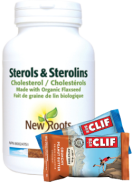 STEROLS & STEROLINS CHOLESTEROL FORMULA FROM NEW ROOTS HERBAL. Research has proven the effectiveness of Sterols and Sterolins on high cholesterol levels, immune health and more. New Roots Cholesterol Strength Sterols and Sterolins formula is specially formulated to help reduce total cholesterol levels and fight artherosclerosis. Conta...STEROLS & STEROLINS CHOLESTEROL FORMULA FROM NEW ROOTS HERBAL. Research has proven the effectiveness of Sterols and Sterolins on high cholesterol levels, immune health and more. New Roots Cholesterol Strength Sterols and Sterolins formula is specially formulated to help reduce total cholesterol levels and fight artherosclerosis. Containing a potent blend of non-GMO Sterols including Beta-Sitsterols, Stigmasterols, Campesterols. New Roots Herbal uses a refined molecular distillation process and is completely free solvents. Vegan Friendly. [SOFTGELS]+ Earn 39 Reward Points
STEROLS & STEROLINS CHOLESTEROL FORMULA FROM NEW ROOTS HERBAL. Research has proven the effectiveness of Sterols and Sterolins on high cholesterol levels, immune health and more. New Roots Cholesterol Strength Sterols and Sterolins formula is specially formulated to help reduce total cholesterol levels and fight artherosclerosis. Conta...STEROLS & STEROLINS CHOLESTEROL FORMULA FROM NEW ROOTS HERBAL. Research has proven the effectiveness of Sterols and Sterolins on high cholesterol levels, immune health and more. New Roots Cholesterol Strength Sterols and Sterolins formula is specially formulated to help reduce total cholesterol levels and fight artherosclerosis. Containing a potent blend of non-GMO Sterols including Beta-Sitsterols, Stigmasterols, Campesterols. New Roots Herbal uses a refined molecular distillation process and is completely free solvents. Vegan Friendly. [SOFTGELS]+ Earn 39 Reward PointsSale: $39.59
Reg.: $44.84 (Save $5.25)
In Stock(Click Add to Select Bonus)
-
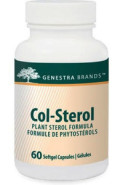 A COMBINATION OF STEROLS AND STEROLINS IN COLSTEROL Research has proven the effectiveness of Sterols and Sterolins on high cholesterol levels, immune health and more. Genestra's ColSterol formula is specially formulated to help reduce total cholesterol levels and fight artherosclerosis by reducing the Low Density Lipoprotein (LDL) and...A COMBINATION OF STEROLS AND STEROLINS IN COLSTEROL Research has proven the effectiveness of Sterols and Sterolins on high cholesterol levels, immune health and more. Genestra's ColSterol formula is specially formulated to help reduce total cholesterol levels and fight artherosclerosis by reducing the Low Density Lipoprotein (LDL) and Total Cholesterol. Containing potent Sterols including betasitosterol, campesterol, stigmasterol. In a convenient sofgel capsule format. [SOFTGELS]+ Earn 37 Reward PointsOur Price: $37.75Out of Stock
A COMBINATION OF STEROLS AND STEROLINS IN COLSTEROL Research has proven the effectiveness of Sterols and Sterolins on high cholesterol levels, immune health and more. Genestra's ColSterol formula is specially formulated to help reduce total cholesterol levels and fight artherosclerosis by reducing the Low Density Lipoprotein (LDL) and...A COMBINATION OF STEROLS AND STEROLINS IN COLSTEROL Research has proven the effectiveness of Sterols and Sterolins on high cholesterol levels, immune health and more. Genestra's ColSterol formula is specially formulated to help reduce total cholesterol levels and fight artherosclerosis by reducing the Low Density Lipoprotein (LDL) and Total Cholesterol. Containing potent Sterols including betasitosterol, campesterol, stigmasterol. In a convenient sofgel capsule format. [SOFTGELS]+ Earn 37 Reward PointsOur Price: $37.75Out of Stock
What Are Plant Sterols?
What are plant sterols? The discovery of plant sterols, a group of naturally occurring compounds found in plants, has been a fascinating journey that has significantly contributed to our understanding of nutrition and its impact on human health. Also known as phytosterols, they were first identified in the early 20th century as cholesterol-like molecules present in plants. Since then, extensive research has unveiled their remarkable composition and elucidated their crucial role in the human body.
Structurally, plant sterols are incredibly similar to cholesterol, a waxy, fatty substance vital for the body's proper functioning. However, they are particularly intriguing because they influence cholesterol metabolism and, subsequently, cardiovascular health. Comprising compounds such as beta-sitosterol, campesterol, and stigmasterol, plant sterols are primarily found in plant-derived oils, nuts, seeds, and vegetables. Their molecular structure enables them to compete directly with dietary and endogenous cholesterol for absorption in the intestines, ultimately reducing cholesterol levels in the bloodstream.
As such, supplementing with plant sterols, alongside a healthy diet and regular exercise, can play a crucial role in managing cholesterol levels and protecting overall cardiovascular health. Below is a breakdown of the effects they have on the overall blood lipid profile.
Health Benefits Of Plant Sterols
- Competitive Inhibition – Plant sterols compete with dietary cholesterol for absorption in the small intestine. This means that when you consume them, they occupy the same transporters and pathways cholesterol uses for absorption. As a result, less cholesterol is absorbed into the bloodstream.
- Reduced LDL Cholesterol – Low-density lipoprotein (LDL) cholesterol, often referred to as "bad" cholesterol, is associated with an increased risk of cardiovascular disease. Plant sterols primarily lower LDL cholesterol levels and help reduce the amount of LDL cholesterol circulating in the bloodstream.
- No Effect On HDL Cholesterol – High-density lipoprotein (HDL) cholesterol is considered "good" as it helps transport cholesterol away from the arteries and to the liver for excretion. Plant sterols do not affect HDL cholesterol levels, which has a cardio-protective effect.
- Overall Cholesterol Reduction – Regular consumption of plant sterols can lead to a modest but meaningful reduction (more or less 15%) in total cholesterol levels and, ultimately, to better cardiovascular health and a reduced risk of cardiovascular events.
Who Should Take Plant Sterols?
While just about anyone can benefit from these supplements, they may be particularly valuable for those with elevated cholesterol levels or at risk of cardiovascular disease. In addition, those striving to manage their cholesterol without much success may significantly benefit from adding them to their daily regimen. Because they are particularly abundant in plant-based foods like nuts, seeds, and vegetables, those with a very limited diet who consume few plant-based foods would be great candidates for plant sterol supplementation.
Plant Sterol Supplement Varieties
These supplements are available in various forms and potencies, including softgels, capsules, or powder, making them easy to incorporate into one’s daily routine. Plant sterol esters are the most common form, as they are more soluble and easily absorbed by the body. Potencies typically range from 400 to 800 mg per serving, with some specialized formulations offering higher concentrations. Always follow the dosing instructions listed on the product you purchase, or consult a qualified healthcare practitioner if you aren't sure what dose you should be taking.
Buying Quality Supplements
When starting these supplements, some people may experience digestive issues like diarrhea, constipation, or upset stomach, especially when taking higher doses. These should subside as the body gets used to supplementation. It’s also worth noting that, while rare, some individuals may have allergies or sensitivities to plant sterols, leading to allergic reactions such as itching, hives, or swelling. If any of these symptoms manifest, discontinue use.
These supplements may interact with certain medications, including, ironically, some cholesterol-lowering drugs (statins). This can potentially reduce the effectiveness of the medications. If you take any medications, consult your healthcare provider before adding them to your daily regimen.
Back to Top ↑
















